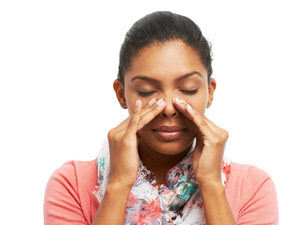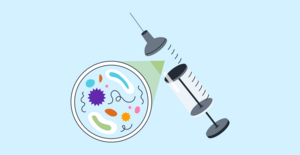Key points
- Home remedies for allergies include saline nasal irrigation, air filters, and natural substances like butterbur and bromelain.
- Allergies are often caused by environmental factors such as pollen, dust mites, mold spores, pet dander, and air pollutants.
- Common allergy symptoms include sneezing, runny nose, itchy eyes, fatigue, and coughing.
- Over-the-counter medications can supplement home remedies, and urgent care clinics can provide prescription-strength medication if needed.

Suffering from allergies can be a frustrating and uncomfortable experience, but you may be able to find fast relief in the comfort of your own home!
While over-the-counter medications are commonly used to alleviate allergy symptoms, many individuals seek natural and home-based remedies to manage their allergies. From local honey to steam inhalation, there are a variety of home remedies that have been embraced for their potential to ease the discomfort associated with allergies. Continue reading to learn some of the best home remedies for allergies that have gained popularity for their potential effectiveness in providing relief from common allergy symptoms.
Common Causes of Allergies
Environmental allergies, also known as allergic rhinitis or hay fever, are typically triggered by allergens in the environment, according to Healthline. Common causes of environmental allergies include:
-
Pollen from trees, grasses, and weeds
-
Microscopic organisms that thrive in household dust, known as dust mites
-
Mold spores, commonly found in damp and poorly ventilated areas
-
Proteins found in the skin, saliva, and urine of pets, known as pet dander
-
Cockroach droppings
-
Outdoor air pollutants from vehicle emissions and industrial pollutants
Common Symptoms of Environmental Allergies
Common symptoms of environmental allergies, according to Healthline, include:
-
Sneezing
-
Runny or stuffy nose
-
Itchy or watery eyes
-
Itchy throat or ears
-
Postnasal drip
-
Fatigue
-
Coughing
-
Wheezing (more common in people with asthma)
-
Headache
-
Dark circles under the eyes (known as allergic shiners)
-
Impaired sense of smell or taste
These symptoms can vary in severity and may be seasonal or persist throughout the year, according to Healthline.
The Best 12 Natural Remedy for Allergies
There are several home remedies for allergies that you probably already have in your home. Some of the best tried-and-true remedies for allergies include:
-
Saline Nasal Irrigation: Saline nasal irrigation helps to flush out allergens and irritants from the nasal passages, reducing congestion and alleviating allergy symptoms, according to Healthline.
-
Air Filters: Air filters can help remove airborne allergens such as pollen, dust mites, pet dander, and mold spores, thereby improving indoor air quality and reducing exposure to allergens, according to Healthline.
-
Butterbur: Butterbur has been shown to have antihistamine and anti-inflammatory properties, which can help alleviate allergy symptoms such as nasal congestion and itchy eyes, according to Healthline.
-
Bromelain: Bromelain, an enzyme found in pineapple, may have anti-inflammatory properties that can help reduce nasal swelling and improve breathing in individuals with allergies, according to VeryWellHealth.
-
Acupuncture: Some studies suggest that acupuncture may help modulate the immune response and reduce allergy symptoms by promoting a balanced immune system and reducing inflammation, according to VeryWellHealth.
-
Probiotics: Probiotics may help regulate the immune system and reduce allergic responses by promoting a healthy gut microbiome and immune function, according to Healthline.
-
Honey: Local honey may contain trace amounts of pollen, and regular consumption may help desensitize the body to local pollen and reduce allergy symptoms in some individuals, according to Healthline. Honey can also help soothe a cough or sore throat that is caused by allergies, according to VeryWellHealth.
-
Air Conditioners and Dehumidifiers: Air conditioners and dehumidifiers can help reduce indoor humidity levels and filter out airborne allergens, creating a more comfortable environment for allergy sufferers, according to Healthline.
-
Spirulina: Some research suggests that spirulina, a type of blue-green algae, may have anti-inflammatory and antioxidant properties that could help alleviate allergy symptoms, according to Healthline.
-
Stinging Nettle: Stinging nettle has been used traditionally for allergy relief and may have anti-inflammatory effects that can help reduce symptoms such as sneezing and itching, according to Healthline.
-
Vitamin C: Vitamin C is an antioxidant that may help reduce histamine levels and alleviate allergy symptoms, particularly in individuals with allergic rhinitis, according to Healthline.
-
Eucalyptus Essential Oil: Eucalyptus essential oil has decongestant and anti-inflammatory properties that can help clear nasal passages and ease respiratory symptoms associated with allergies, according to VeryWellHealth.
Over-the-counter Options for Allergies
If you want to supplement your home remedies with some over-the-counter options, there are several you can choose from, including:
-
Antihistamines — Available in pill, nasal spray, or liquid forms and can help with itchy eyes, runny noses, and sneezing
-
Nasal corticosteroids - a type of nasal spray that reduces inflammation
-
Decongestants - Medications that work by shrinking the lining of the nasal passages to reduce stuffiness
-
Eye drops - Used for short-term relief of redness, itchiness, and swelling
Urgent Care Near Me
If home remedies and over-the-counter options are not helping you from relief from your symptoms, you can get prescription-strength medication. One way to do this is to visit an urgent care clinic. You can find your closest urgent care clinic and even book an appointment using Solv.
FAQs
What are some effective home remedies for allergies?
Home remedies include saline nasal irrigation, using air filters, and consuming natural substances like butterbur, bromelain, and local honey.
What are common causes of allergies?
Allergies are often triggered by environmental factors such as pollen, dust mites, mold spores, pet dander, and air pollutants.
What are the typical symptoms of allergies?
Symptoms can include sneezing, a runny or stuffy nose, itchy or watery eyes, an itchy throat or ears, and fatigue.
Can over-the-counter medications help with allergies?
Yes, over-the-counter options like antihistamines, nasal corticosteroids, and decongestants can help manage allergy symptoms.
What if home remedies and over-the-counter medications don't provide relief?
If these options are not effective, you can visit an urgent care clinic for prescription-strength medication.









